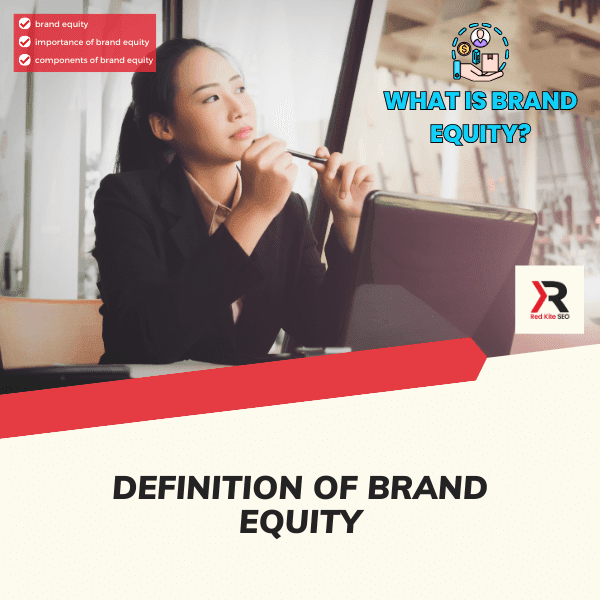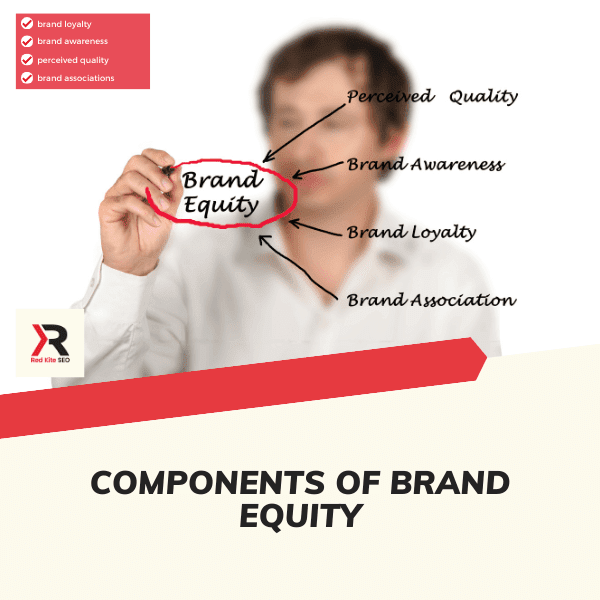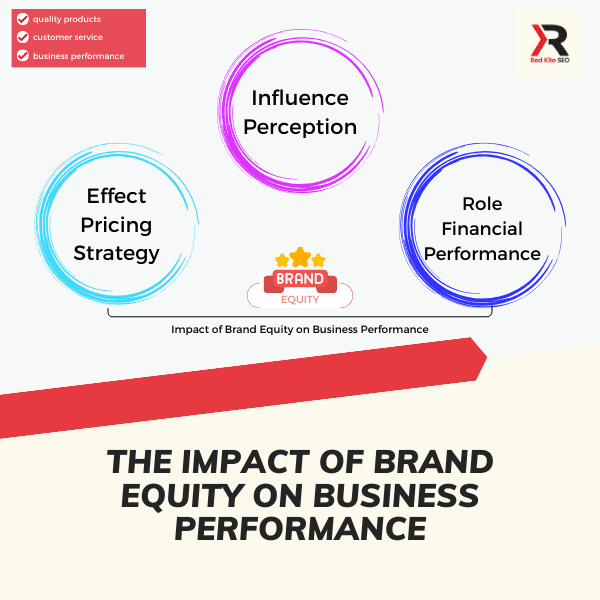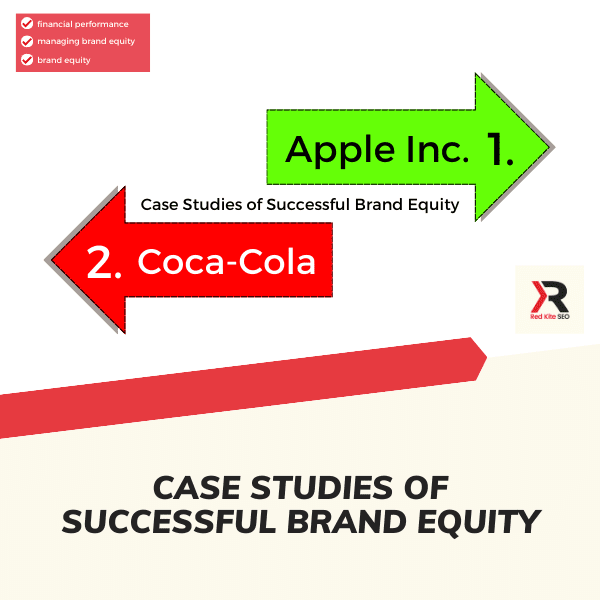Definition of Brand Equity

Simple Explanation of Brand Equity
Brand equity refers to the value that a brand name brings to a company. It is based on consumer attitudes about positive brand aspects and favourable experiences with the brand.
Importance of Brand Equity in Business
Brand equity plays a significant role in business. A strong brand can lead to increased sales, more customer loyalty, and greater competitive advantage.
For an in-depth exploration and to find answers to your most pressing queries, be sure to read our related article about on Brand Awareness.
Components of Brand Equity

Brand Loyalty
One component of brand equity is brand loyalty, which occurs when customers continue to purchase from your business over competitors due to their trust and commitment towards your products or services.
Brand Awareness
Another vital element is awareness; people must know that your product exists before they can develop any sort of preference for it.
Perceived Quality
The perceived quality affects how consumers view the worthiness or superiority of one product compared to others.
Brand Associations
Finally, associations are the specific qualities that come into consumers’ minds when thinking about a particular product or service.
How To Measure Brand Equity

Direct Methods:
- Conducting Brand Audits – A direct method for measuring this involves performing audits where you evaluate all customer-facing aspects related to your products.
- Customer Surveys – Direct feedback from customers via surveys helps companies gain insights into their perceptions regarding brands’ strengths and weaknesses.
Indirect methods:
- Price Premium – Consumers’ willingness to pay more for branded goods versus non-branded equivalents indicates high levels of brand strength.
- Market Share – The amount of control a firm holds within its market indicates relative power compared to other industry players.
Building Brand Equity

Creating Strong Brands:
- Clear vision – defining what exactly stands meaningfully differentiates competition crucial step in building a solid foundation.
- Consistent message – Ensure every communication strategy aligns with core values and reinforces identity public eye.
Enhancing Awareness:
- Effective Marketing Strategies – Use a combination of traditional digital marketing strategies to increase visibility.
- Social Media Presence – Create and maintain active social media profiles reach a wider audience, and engage users in real time.
Establishing Loyalty:
- Quality Products Services – Offering superior quality products and services a surefire way to earn customers trust and loyalty.
- Excellent Customer Service – Providing excellent customer service can ensure customers feel valued and satisfied, thereby promoting brand loyalty.
The Impact of Brand Equity on Business Performance

Influence Perception:
Positive brand equity influences consumers’ perceptions about a product or company, making them more likely to choose it over competitors.
Effect Pricing Strategy:
With higher perceived value among consumers due to strong reputation and good experiences previous purchases firms command premium pricing offerings compared to rivals market.
Role Financial Performance:
Strong brands generate better financial results in terms of sales and profits because they attract more customers and make them willing to pay a premium price for their products or services.
Case Studies of Successful Brand Equity

Case Study 1: Apple Inc. is an example of successful management as its commitment to innovation and high-quality design led to strong global recognition and respect.
Case Study 2: Another notable case study would be Coca-Cola; the company has developed a powerful international presence through consistent branding and extensive advertising campaigns that resonate with consumers worldwide.
Common Mistakes in Managing Brand Equity

Inconsistent Branding
One common mistake in managing this involves inconsistent branding where companies fail to deliver a uniform image message across all communication channels and platforms leading to confusion and lack of recognition amongst target audiences.
Neglecting Customer Feedback
Ignoring valuable input from your audience – could lead to potential lost opportunities for improvement also damage relationships causing a decrease in satisfaction levels and an overall negative impact on the reputation success rate within the industry.
Failing to Adapt to Market Changes
Not keeping up with changing trends and demands within the marketplace can cause businesses to lose relevance and become outdated quickly – ultimately damaging their position against comparative competition.
Tips for Maintaining Improving Brand Equity

Regular Audits
Perform regular audits to assess performance areas for improvement potentially minimising any risks that may affect future periods ensuring success and longevity competitive marketplace.
Continuous Improvement Products Services
Strive for continuous improvement of product offerings always meeting customer expectations ensuring they remain satisfied and loyal to your brand over time further solidifying market position potential for growth profits long term.
Consistent Engagement Customers
Engage customers regularly through various mediums of communication such as social media platforms, email newsletters, face-to-face interactions, etc., keeping them informed about new products services company updates general news events relating directly and indirectly to the business this will help build stronger relationships and increase trust and loyalty over time.
Final Thoughts Brand Equity
Recap Key Points
To recap the main points we’ve discussed refer value that a name brings to a firm. It comprises components such as brand loyalty, awareness, perceived quality, and associations. Companies can measure it via direct and indirect methods while building it requires clear vision and consistent messaging among other strategies.
Importance Ongoing Management
Managing ongoing basis imperative survival profitability modern day businesses – those who fail do risk losing relevance becoming obsolete swiftly due constant evolution consumer preferences competition industry dynamics therefore essential keep track regular intervals ensure optimal performance at all times maximise potentials benefits associated with having strongly established in the marketplace.
Frequently Asked Questions
What is Brand Equity?
It’s the value that a brand brings to a company based on positive consumer perceptions and experiences with the product or service.
Why is Brand Equity important?
It can lead to increased sales and more customer loyalty thereby giving companies a greater competitive advantage.
How do you measure Brand Equity?
You can use both direct (brand audits & surveys) and indirect methods (price premium & market share).
Can you provide examples of successful brands?
Apple Inc. Coca-Cola is a notable example of successful management yielding high recognition and respect globally.

Pete Hogg is an accomplished SEO consultant with a proven track record of driving organic traffic and boosting online visibility. With 8 years of experience in the ever-evolving world of digital marketing, he has helped businesses achieve top rankings on search engines. A passionate advocate for SEO best practises, Pete Hogg combines technical expertise with a deep understanding of content strategy to deliver results that matter. When not optimising websites, he enjoys wheelchair rugby. Connect with Pete Hogg to take your online presence to the next level.

